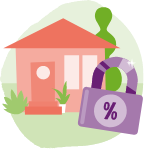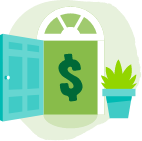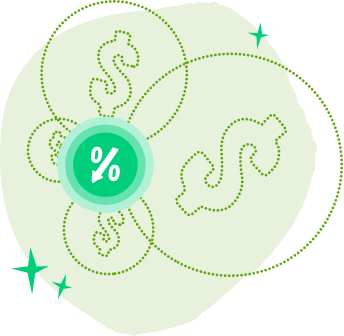- Personal
- Membership
- Membership
- Rates & Fees
- Checking
- Checking
- Personal Loans
- Personal Loans
- Wealth Management
- Investment Services
- Financial Advisors
- Resource Center
- Business
Home Loans
Home › Home & Auto › Home Loans
Home Sweet Loan
Buying a home is a huge life event. Whether you’re buying your first home or your dream home, you’ll probably need a mortgage. That’s where we come in. We offer a variety of home loans to fit your needs at competitive rates. Fixed-rate and adjustable-rate options. FHA, VA and USDA Loans. Jumbo loans, professional loans and mortgages with down payment assistance. We’ve got you covered no matter what you need.
Let’s Get Started
The homebuying process might seem complicated, especially if you’re a first-time homebuyer, but we’re here to make it simple. Our professional Real Estate Loan Officers can help you along the way, explaining all the complicated parts and working with you to find the ideal mortgage type for your situation.
We’re available Monday – Friday, 8am to 5pm.
800.839.6328, ext. 2694Ready to go?
Apply for a mortgage today.Did You Know?
Grow offers adjustable-rate mortgages (ARMs), ensuring you feel confident when putting down roots. An ARM may be a good choice if you want to maximize your buying power and keep your payments lower during the first few years of your loan. Contact one of our Real Estate Loan Officers to determine which loan is the best fit to help you grow.
Home Loans Interest Rate APR Monthly Payment* 10-Year Fixed As low as 6.000% As low as 6.106%1 $3,331 15-Year Fixed As low as 6.000% As low as 6.075%1 $2,532 20-Year Fixed As low as 6.125% As low as 6.279%1 $2,171 30-Year Fixed As low as 6.250% As low as 6.367%1 $1,847 3/1 Year ARM Year 1-3: As low as 5.500%
Year 4-30: As low as 7.500%Year 1-3: As low as 5.544%2
Year 4-30: As low as 7.500%2Year 1-3: $1,703
Year 4-30: $2,0705/1 Year ARM Year 1-5: As low as 5.625%
Year 6-30: As low as 7.625%Year 1-5: As low as 5.669%2
Year 6-30: As low as 7.630%2Year 1-5: $1,726
Year 6-30: $2,0765/5 Year ARM Year 1-5: As low as 5.875%
Year 6-10: As low as 7.875%Year 1-5: As low as 5.919%2
Year 6-10: As low as 7.875%2Year 1-5: $1,775
Year 6-10: $2,20610/1 ARM Year 1-10: As low as 6.250%
Year 11-30: As low as 8.250%Year 1-10:As low as 6.295%2
Year 11-30: As low as 8.250%2Year 1-10: $1,847
Year 11-30: $2,46910-Year Fixed As low as 6.000% 15-Year Fixed As low as 6.000% 20-Year Fixed As low as 6.125% 30-Year Fixed As low as 6.250% 3/1 Year ARM Year 1-3: As low as 5.500%
Year 4-30: As low as 7.500%5/1 Year ARM Year 1-5: As low as 5.625%
Year 6-30: As low as 7.625%5/5 Year ARM Year 1-5: As low as 5.875%
Year 6-10: As low as 7.875%10/1 ARM Year 1-10: As low as 6.250%
Year 11-30: As low as 8.250%10-Year Fixed As low as 6.106%1 15-Year Fixed As low as 6.075%1 20-Year Fixed As low as 6.279%1 30-Year Fixed As low as 6.367%1 3/1 Year ARM Year 1-3: As low as 5.544%2
Year 4-30: As low as 7.500%25/1 Year ARM Year 1-5: As low as 5.669%2
Year 6-30: As low as 7.630%25/5 Year ARM Year 1-5: As low as 5.919%2
Year 6-10: As low as 7.875%210/1 ARM Year 1-10:As low as 6.295%2
Year 11-30: As low as 8.250%210-Year Fixed $3,331 15-Year Fixed $2,532 20-Year Fixed $2,171 30-Year Fixed $1,847 3/1 Year ARM Year 1-3: $1,703
Year 4-30: $2,0705/1 Year ARM Year 1-5: $1,726
Year 6-30: $2,0765/5 Year ARM Year 1-5: $1,775
Year 6-10: $2,20610/1 ARM Year 1-10: $1,847
Year 11-30: $2,46910-Year Fixed 15-Year Fixed 20-Year Fixed 30-Year Fixed 3/1 Year ARM 5/1 Year ARM 5/5 Year ARM 10/1 ARM *The payment does not include taxes and insurance; therefore, the actual payment obligation will be greater. Above examples are shown without discount points. Payment based on a $300,000 loan amount. The rates are effective as of 07/06/2025 and are subject to change. Rates displayed are the lowest rates available.
1Annual Percentage Rate (APR). Minimum loan amount is $40,000. A minimum down payment of 5% is required. Down payment requirements may vary depending on the property type, loan purpose, LTV or other factors. Your rate is based on your creditworthiness and LTV. PMI required for LTVs greater than 80%. Mortgages are available in the following states: Florida, South Carolina, North Carolina, Georgia, Tennessee and Alabama. The mortgage must be secured by your home, which must be owner occupied and a single-family residence, excluding manufactured homes. Property insurance is required, and if applicable, flood insurance will be required.
2Adjustable-Rate Mortgages (ARMs) are variable, and your APR may increase after the original fixed-rate period. The first adjusted payment is based on the average yield on a 1-year U.S. Treasury Securities (index) plus a margin. Rates vary based on creditworthiness, LTV, occupancy, loan purpose and/or other factors. The floor is 4% and the minimum loan amount is $40,000. Payments are based on a 30-year amortization. A minimum down payment of 5% is required. Down payment requirements may vary depending on the property type, loan purpose, LTV or other factors. Mortgages are available in the following states: Florida, South Carolina, North Carolina, Georgia, Tennessee, and Alabama. The mortgage must be secured by your home, which must be owner occupied and a single-family residence, excluding manufactured homes. Property insurance is required, and if applicable, flood insurance will be required.
All loans are subject to credit approval.
Not all will qualify for the lowest rate.
Choosing the Right Mortgage for You
Our various loan offerings get you one step closer to finding your way home.

Adjustable-Rate Mortgages
Adjustable-Rate Mortgages, ARMs, offer a lower starting interest rate and therefore, a lower monthly payment. Your rate and your payment may increase, though, as time goes on. ARMs are useful loans for a variety of circumstances.

Fixed-Rate Mortgages
Fixed-rate mortgages are simple. Your payment will not change over the life of your loan because your interest rate cannot change. These are among the most popular loans for those reasons.

Jumbo Loans
Need to borrow more than $726,200.00? A Jumbo Loan may be your answer. We offer a variety of Jumbo loans to meet your needs.

Unique Loans
We offer a number of unique loans that may fit your particular needs. FHA, VA and others. Talk with us about your needs and we’ll help find a loan that is right for you.

Home Equity Loans
Home Equity loans let you borrow against the equity in your home. Looking to remodel? Finance a college education? Consolidate debt? Our Home Equity programs may be just the answer.

Debt Consolidation Refinance
A debt consolidation refinance puts your home’s equity to work paying off high-interest debt. You’ll enjoy one monthly payment with a much lower interest rate compared to revolving loans, like credit cards.

Adjustable-Rate Mortgages, ARMs, offer a lower starting interest rate and therefore, a lower monthly payment. Your rate and your payment may increase, though, as time goes on. ARMs are useful loans for a variety of circumstances.

Fixed-rate mortgages are simple. Your payment will not change over the life of your loan because your interest rate cannot change. These are among the most popular loans for those reasons.

Need to borrow more than $726,200.00? A Jumbo Loan may be your answer. We offer a variety of Jumbo loans to meet your needs.

We offer a number of unique loans that may fit your particular needs. FHA, VA and others. Talk with us about your needs and we’ll help find a loan that is right for you.

Home Equity loans let you borrow against the equity in your home. Looking to remodel? Finance a college education? Consolidate debt? Our Home Equity programs may be just the answer.
Learn About Home Equity Loans
A debt consolidation refinance puts your home’s equity to work paying off high-interest debt. You’ll enjoy one monthly payment with a much lower interest rate compared to revolving loans, like credit cards.
How to Prepare for Your Upcoming Appointment:
Coming to see us soon? Make sure you have everything
you need prior to your appointment time.Proof of residential address, or addresses, for the past two years
Social Security numbers for all borrowers
Employment history for the past two years, including employer(s) name, address and phone number
Income information for all borrowers, including salary, overtime, bonuses, commissions, interest/dividends, retirement income and any other regular source of income
Price of the home you are buying, and how much you’d like to borrow
Address of the property you are planning to purchase
Bank and brokerage account information, including the institution name and current balances
Information about real estate you own. If you own real estate: we’ll have some basic questions including address, current market value, amount you owe, the rental income you receive (if any) and monthly payment
Information about your current debts: the name of the creditor, account number, current balance owing and the monthly payment amount
Subject to credit approval.
Grow Financial mortgage loans are valid for the purchase or refinance of owner-occupied residential properties in the states of Florida, South Carolina, North Carolina, Georgia, Alabama and Tennessee, including single-family detached, condominiums and townhomes. Not valid for the purchase of investment properties. Grow Financial mortgage loan rates are updated daily and available at growfinancial.org.
How to Find Your Routing & Account Numbers
When you make a payment online, by phone or on a mobile device, you may be asked for our routing number and your checking account number. Credit unions and banks use these numbers to identify accounts and make sure money gets where it’s supposed to be. You’ll also need to provide your routing and checking account numbers for:
- Direct deposits
- Electronic checks
- Military allotments
- Wire transfers
Where to Find Your Routing & Checking Account Numbers
Your personal checks include both our routing number and your account number, as shown on the Grow check example below.

Don’t have a Grow check? No worries.
Visit any Grow store and ask for a Direct Deposit Form. It lists both your routing number and checking account number.
Making a Loan Payment
Incorrect Phone Number Alert
We’ve identified an incorrect phone number listed in a letter sent to a select group of new members with auto loans. The incorrect number is NOT affiliated with Grow. Please be sure to use our official phone number, 800.839.6328, which you can verify on our Contact Information page. For your security, keep your personal information safe and avoid sharing it over the phone, email or text message. We will never ask you for your credit or debit card security code, expiration date or PIN, login security codes, or your online banking password.
When it comes to making payments, we try to make it as painless as possible to pay your loan every month. We have several different ways to pay, including convenient online options.
Pay Online
You have two ways to pay online by transferring funds from another bank or credit union.
- Grow Online Banking (Preferred payment method for any loan)
This is the simplest way to pay your loan. You can make one-time payments or set up automatic recurring payments in Grow Online Banking. Once you log in, select “Transfer/Payments” from the menu. If you’re not enrolled in Grow Online Banking yet, you can set up your account in just a few minutes.
Log In
- Debit Card or ACH (Available for auto, personal loans and HELOCs)
Note: ACH and debit card payments are not available for credit cards or most mortgages, except HELOCs.
We accept ACH payments with no additional fees, consumer Mastercard® and Visa® debit cards with a convenience fee of $4.95, or commercial Mastercard® and Visa® debit cards with a convenience fee of 2.95% of the payment amount. To get started with an online ACH or debit card payment, select Pay Now below.
Pay Now
Pay by Mail
You can also pay any Grow loan by check through the mail. Please remember to include your account number and Grow loan number on the check. (For credit card payments, please do not write your 16-digit credit card number on the check, which can cause a delay in processing the payment.)
Address for auto, credit card, personal loan and HELOC payments:
Grow Financial Federal Credit Union
P.O. Box 75466
Chicago, IL 60675-5466Address for personal first or second mortgages and home equity payments:
Grow Financial Federal Credit Union
P.O. Box 11733
Newark, NJ 07101-4733You Are About To Leave GrowFinancial.org
At certain places on this site, there are links to other websites. Grow Financial Federal Credit Union does not endorse, approve, represent, certify or control those external sites. The credit union does not guarantee the accuracy, completeness, efficacy, timeliness or accurate sequencing of the information contained on them. You will not be represented by Grow Financial Federal Credit Union if you enter into a transaction. Privacy and security policies may differ from those practiced by the credit union. Click CONTINUE if you wish to proceed.
